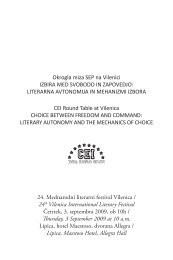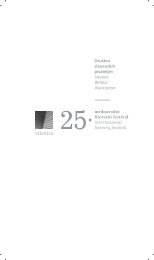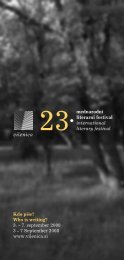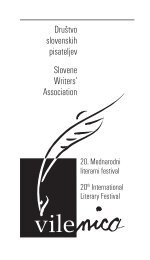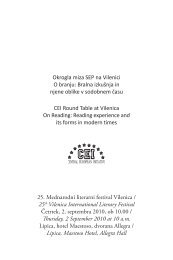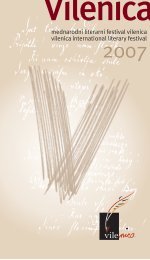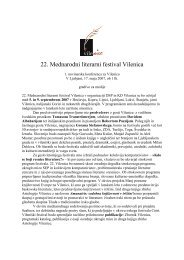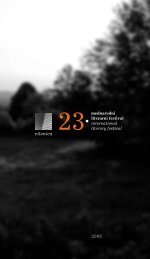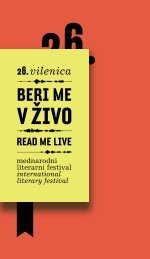Publikacija SEP 2011 - Vilenica
Publikacija SEP 2011 - Vilenica
Publikacija SEP 2011 - Vilenica
Create successful ePaper yourself
Turn your PDF publications into a flip-book with our unique Google optimized e-Paper software.
hand, as well as Gertrude Stein and some of her key works on the<br />
other. The most important thing to note is that sound poetry, in the<br />
course of its own development, from Velimir Khlebnikov and Henri<br />
Chopin to Charles Amirkhanian and John Cage, has discovered its<br />
boundary – the space between voice, word and sound. More than<br />
that, this type of poetry is on the boundary. And this boundary, sadly,<br />
separates it from traditional poetry. If slam is radical in its act of performing,<br />
then sound poetry is radical in its act of exploring language<br />
and its semantic, syntactic and phonetic value.<br />
IV. Dadaism and Its Impact on Literary Performance<br />
Dadaism is an avant-garde movement, which has played a key role<br />
in expanding the boundaries of performing literary works (not only<br />
works of poetry), crucial to the conception of sound poetry, as well<br />
as to later understanding of slam poetry. It represents an approach to<br />
performance that, as is characteristic of many avant-garde approaches,<br />
is based on opposition to the existing, calls for change and is in search<br />
of the new. It was truly an important change: it was not merely a<br />
variation on previous approaches to performance (such as we are seeing<br />
nowadays), but a change which produced the act of freedom in<br />
poetry performing. Costumes, “verses without words”, various kinds<br />
of intonation and stress, as well as singing. In 1916, the German poet<br />
Hugo Ball established and also ran Cabaret Voltaire, a sort of Dadaist<br />
club, which organized art events, such as the one mentioned earlier.<br />
With his definition verses without words, Hugo Ball became one of<br />
the fathers of sound poetry; however, what is central in the context<br />
of poetry performance is his style of performing, his approach to interpretation.<br />
His interpretation is a complete discharge, liberation,<br />
improvisation. As I am not focusing on sound or slam poetry in this<br />
text, what matters is only the Dadaist element of performing, the element<br />
of approach to performing one’s work. It is true that most of the<br />
so-called traditional poetry is meant to be read in silence. This type<br />
of poetry is, when it comes to performance and in line with what has<br />
17



